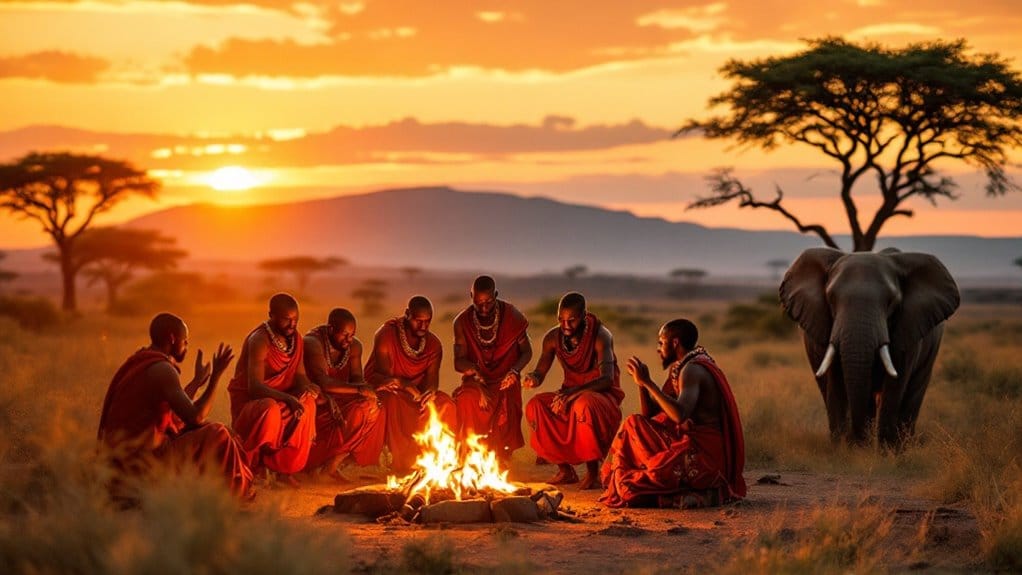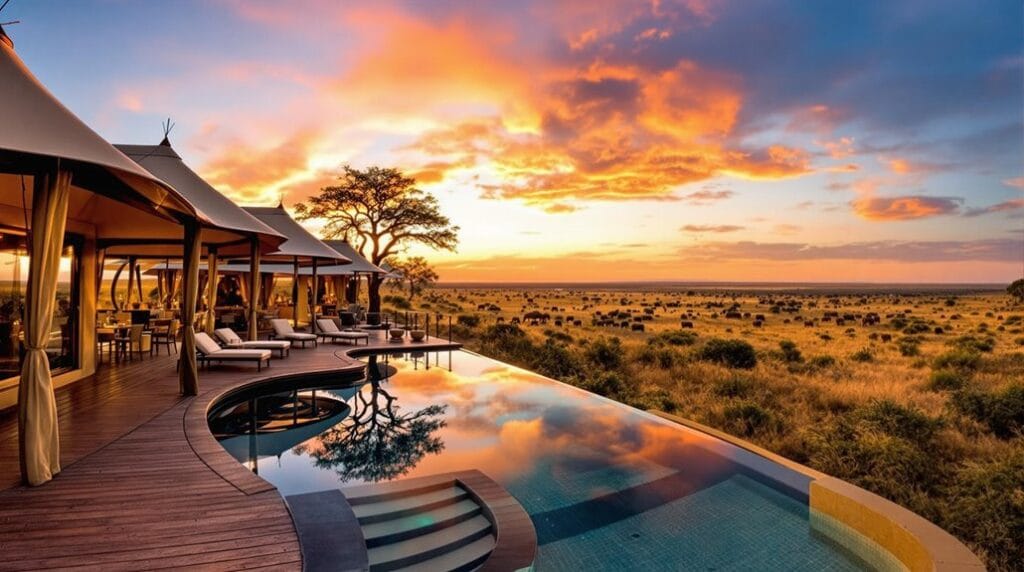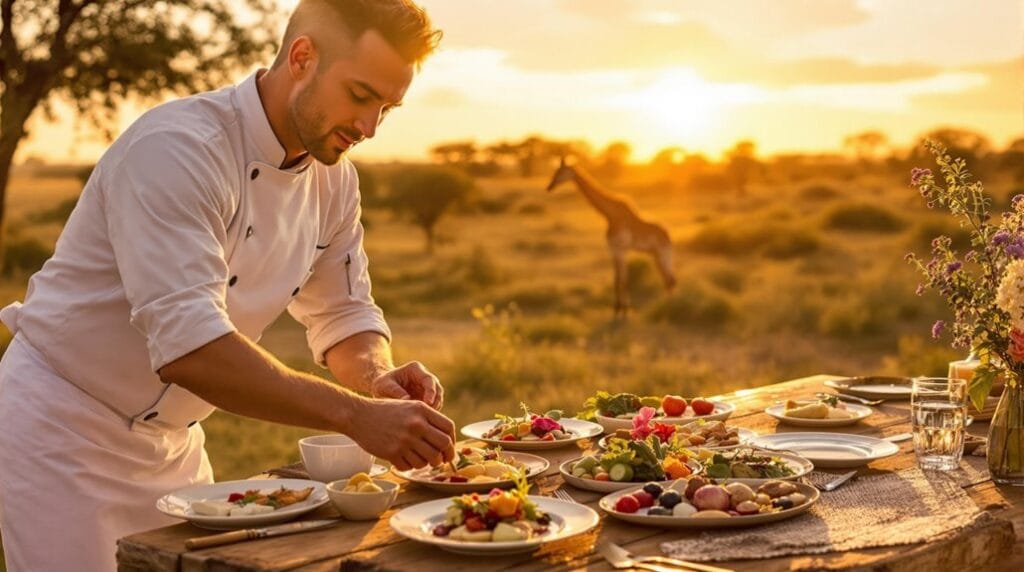During your safari, you might experience the exhilarating Maasai Jumping Dance, a vibrant celebration of strength and community. You'll see Himba body painting rituals that tell deep ancestral stories through intricate designs. Zulu traditional music and dance will captivate you, each performance weaving themes of unity and heritage. Ancestral storytelling sessions invite you to engage, enriching your understanding of local traditions through shared narratives. Join in lively harvest festivals that honor the agricultural calendar and express gratitude for bountiful yields. These rituals immerse you in the rich cultural mosaic of Africa, and there's much more to explore beyond this glimpse.
Key Takeaways
- Experience the Maasai Jumping Dance (Adumu) to witness cultural identity and bravery while engaging with rhythmic chants that strengthen community bonds.
- Participate in Himba body painting rituals to understand the significance of red ochre and its connection to identity, fertility, and ancestral ties.
- Enjoy Zulu traditional music and dance, where vibrant harmonies and storytelling convey messages of unity and social issues during community celebrations.
- Attend ancestral storytelling sessions that preserve community values and involve music and dance, enriching your understanding of the local culture.
- Join harvest festivals like "Mokete" to celebrate agricultural heritage, express gratitude to ancestors, and experience vibrant traditional attire and communal feasts.
The Maasai Jumping Dance
When you witness the Maasai jumping dance, or "Adumu," you can't help but feel the energy and pride radiating from the young warriors. This traditional ritual is more than just a performance; it's a vivid expression of cultural identity and bravery. As the warriors take turns leaping into the air, you see their shúkà cloaks fluttering against the backdrop of a stunning landscape, each jump a declaration of strength and skill.
The rhythmic chants that accompany each leap bind the community together, reinforcing social bonds that have stood the test of time. During significant events like coming-of-age ceremonies and weddings, the Maasai jumping dance transforms into a visual spectacle, symbolizing the shift from youth to responsibility.
The intricate beadwork adorning the dancers adds richness to the scene, reflecting the artistry of Maasai culture. As you observe, you become part of something larger—a community celebration that honors tradition and resilience. The exuberance you feel is shared among the audience and dancers alike, creating a sense of belonging that enhances your safari adventures.
In that moment, the Maasai jumping dance isn't just performance; it's a vibrant connection to a proud heritage.
Himba Body Painting Rituals
As you immerse yourself in the vibrant world of the Himba people, the ritual of body painting unfolds as a fascinating blend of artistry and cultural significance. This practice reflects not only beauty but also the rich identity of this indigenous community. The Himba utilize a mixture of butterfat and ochre pigment to create intricate designs, each bearing unique meanings tied to status and heritage.
Here are three key aspects of Himba body painting rituals:
- Cultural Significance: The vibrant red ochre symbolizes earth, fertility, and life, grounding the community in their ancestral ties and natural environment.
- Artistic Expression: Each pattern painted on the skin tells a story, representing individual and familial heritage, making every design a canvas of personal identity.
- Practical Benefits: Beyond aesthetics, the body painting serves to protect the skin from the harsh sun and pesky insects, showcasing traditional practices that intertwine beauty and practicality.
Engaging with these rituals during your safari adventures offers profound insights into the Himba's world, inviting you to appreciate the deeper meanings of beauty and identity within this remarkable culture.
Zulu Traditional Music and Dance
The Zulu people's vibrant traditional music and dance pulse with the heartbeat of their culture, offering an enthralling window into their rich heritage. When you witness Zulu traditional music, you're enveloped in vibrant vocal harmonies that resonate deeply, accompanied by instruments like the uKhamba and isitolotolo. This creates a rich auditory experience that speaks volumes about their cultural heritage.
Dance performances play an essential role in Zulu ceremonies, with traditional dances like Indlamu showcasing rhythmic stomping and energetic movements. These dances celebrate significant events such as weddings and victories, embodying the community's spirit.
The colorful attire and intricate beadwork worn during performances add to the visual spectacle, with each color and pattern holding specific cultural significance.
Engaging in festivals and gatherings featuring Zulu music and dance offers you a unique chance for cultural exchange. You'll find yourself swept up in community celebrations that convey messages of unity, love, and social issues through powerful storytelling techniques.
In experiencing these vibrant performances, you'll not only witness the Zulu culture but also feel a profound connection that enriches your understanding of their enduring legacy.
Ancestral Storytelling Sessions
Gathered around a crackling fire under a starlit sky, you find yourself immersed in the world of ancestral storytelling sessions, where the wisdom of elders flows like the gentle breeze.
Here, traditional tales come alive, offering not just entertainment but a profound connection to community values and heritage.
As the storyteller weaves narratives, you engage in an interactive experience that transcends mere listening.
The atmosphere pulses with music and dance, enriching your understanding of local traditions and social norms.
Each story is a thread in the vibrant tapestry of culture, revealing lessons that resonate with both young and old.
You'll discover:
- Cultural Significance: Each tale reflects the community's values, preserving wisdom and morals.
- Interactive Engagement: You're encouraged to share your thoughts, fostering a sense of belonging.
- Multi-Sensory Experience: The integration of music, dance, and visual art deepens your connection to the stories.
Through these sessions, you become part of a rich lineage, where the past and present harmoniously intertwine, reminding you of the power of storytelling in nurturing identity and community.
Harvest Festivals and Celebrations
Harvest festivals in Africa pulse with life and color, drawing communities together to celebrate the end of the farming season. You'll find yourself swept up in the joyous atmosphere of events like the Tswana's "Mokete" and the Zulu "Umkhosi Wokweshwama."
These cultural celebrations are more than mere festivities; they're immersive experiences that showcase the region's agricultural heritage. As you participate, you'll witness local communities donning vibrant traditional attire, sharing communal feasts, and engaging in spirited traditional music and dance.
During these festivals, rituals expressing gratitude to ancestral spirits for a bountiful harvest emphasize a profound connection between the land and its people. You'll learn about indigenous agricultural techniques, gaining insights into sustainable practices that have sustained generations.
These festivals often align with lunar cycles, offering an ideal opportunity for you to witness and partake in authentic cultural practices.
As you immerse yourself in the rich tapestry of these harvest celebrations, you'll feel a sense of belonging, as if you're part of a larger story woven into the fabric of Africa's diverse cultures.
Frequently Asked Questions
How Can I Participate in These Traditional Rituals During My Safari?
To participate in traditional rituals during your safari, connect with local guides who emphasize cultural significance. Engage in storytelling traditions, enjoy dance performances, and embrace spiritual beliefs, ensuring community involvement and ethical considerations throughout your immersive experiences.
Are These Rituals Performed Year-Round or Only During Specific Seasons?
These rituals often reflect cultural calendars, so you'll find year-round practices alongside seasonal significance. Community involvement varies with local festivals, revealing historical roots and spiritual meanings while showcasing ritual variations tied to ecological contexts and tourism impacts.
Do I Need to Pay to Attend These Cultural Experiences?
You won't believe how transformative these cultural experiences can be! Yes, there's often a fee, reflecting their cultural significance and supporting local communities. Respect visitor etiquette, understand event schedules, and embrace the immersive, ethical journey ahead.
What Should I Wear When Attending a Traditional Ritual?
When attending a traditional ritual, choose respectful clothing in vibrant cultural attire. Consider weather and local customs; opt for breathable fabrics, layered options, and traditional patterns. Complement with appropriate footwear and minimal jewelry to honor the occasion.
Are Photography and Videography Allowed During These Rituals?
When attending rituals, it's essential to understand local customs and seek permission before using your camera. Respectful behavior and photography etiquette enhance your experience while honoring the ritual's significance and spiritual meanings without disrupting the moment.
Conclusion
As you immerse yourself in these vibrant African rituals, you're not just a spectator; you're part of a living tapestry of culture. Did you know that nearly 80% of Africa's population still engages in traditional practices? This connection to heritage enriches your safari experience, allowing you to witness the resilience and creativity of these communities firsthand. Embrace the rhythms, colors, and stories, and let them deepen your understanding of the land and its people.








